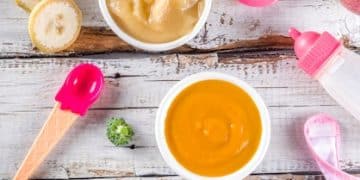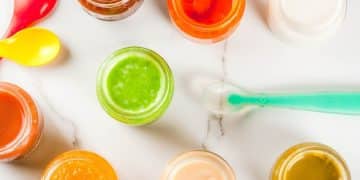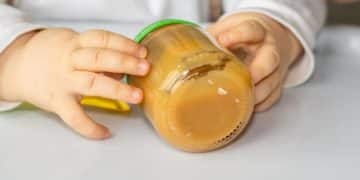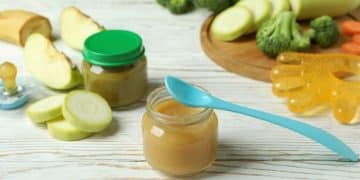Baby Food Pouches vs. Homemade: Which is More Nutritious?
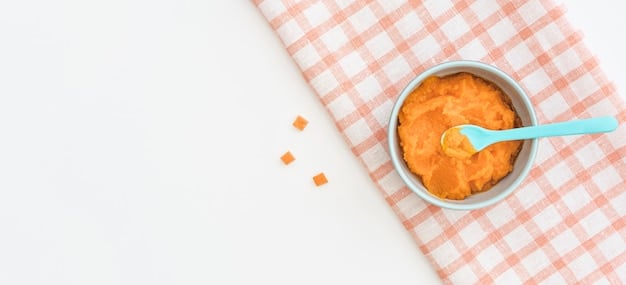
Baby food pouches offer convenience, but when considering the truth about baby food pouches and comparing them to homemade options, nutritional value, ingredients, and potential contaminants should be carefully evaluated to ensure your baby receives the best possible nourishment.
Navigating the world of baby food can be overwhelming. Are those colorful, convenient baby food pouches really as nutritious as the meals you lovingly prepare at home? Let’s dive into the truth about baby food pouches and uncover what’s best for your little one.
The Convenience Factor of Baby Food Pouches
In today’s fast-paced world, convenience is king. Baby food pouches fit seamlessly into busy lifestyles, offering a grab-and-go solution that eliminates the need for extensive meal preparation. But does this convenience compromise nutritional value?
Baby food pouches are undeniably convenient. They are easy to transport, require no refrigeration until opened, and are simple to serve, making them a go-to option for parents on the move.
Portability and Storage
One of the most significant advantages of pouches is their portability. You can easily toss a pouch into your diaper bag without worrying about leaks or spills. The compact size also makes them ideal for travel and outings.
Ease of Use
Pouches are incredibly easy to use. Simply squeeze the contents onto a spoon or allow your baby to suck directly from the pouch. This eliminates the need for bowls and spoons, making feeding time less messy.
- No Preparation Needed: Pouches require no cooking or blending, saving you valuable time.
- Easy to Serve: They can be served directly from the pouch, reducing cleanup.
- Travel-Friendly: Pouches are lightweight and perfect for on-the-go feeding.
While convenience is a major draw, it’s essential to consider whether the nutritional content of pouches matches that of homemade baby food. Let’s explore the key nutritional aspects.
Nutritional Comparison: Pouches vs. Homemade
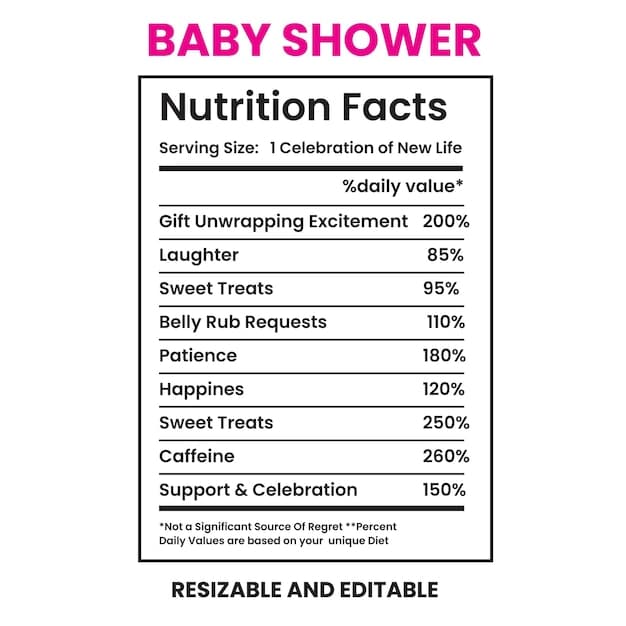
When it comes to nourishing your baby, understanding the nutritional differences between baby food pouches and homemade options is crucial. While both can provide essential nutrients, key factors such as ingredient quality, processing methods, and potential additives can significantly impact their nutritional profiles.
Homemade baby food offers the advantage of complete control over ingredients. You can choose fresh, organic produce and ensure that no unwanted additives or preservatives make their way into your baby’s meal.
Ingredient Quality
Homemade baby food allows you to select the highest quality ingredients. You can opt for organic, locally sourced produce, which often contains higher levels of vitamins and minerals.
Processing Methods
Commercial baby food pouches undergo various processing methods to ensure shelf stability. These processes can sometimes degrade the nutritional content of the food. Homemade baby food, on the other hand, can be prepared using gentle cooking methods that preserve nutrients.
- Freshness: Homemade baby food is typically consumed soon after preparation, maximizing nutrient retention.
- Control: You have complete control over the ingredients and preparation methods.
- Variety: You can easily create a wide variety of flavors and textures to suit your baby’s preferences.
However, pouches aren’t without their merits. Many brands fortify their products with essential vitamins and minerals, ensuring that babies receive a balanced diet. But it’s vital to read labels carefully and understand what you’re feeding your little one.
Potential Downsides of Baby Food Pouches
Despite their convenience, baby food pouches do have potential downsides that parents should be aware of. These include the risk of heavy metal contamination, the impact on oral motor development, and the potential for picky eating habits.
Recent studies have raised concerns about the presence of heavy metals in commercial baby food products, including pouches. These contaminants can pose serious health risks to infants and young children.
Heavy Metal Contamination
Heavy metals such as lead, arsenic, and cadmium can find their way into baby food through contaminated soil and water. These toxins can accumulate in a baby’s body and cause developmental problems.
Oral Motor Development
The sucking action required to empty a pouch can hinder the development of proper chewing and swallowing skills. Babies who primarily consume pureed foods may be less likely to accept textured foods later on.
- Picky Eating: Over-reliance on pouches can lead to picky eating habits as babies become accustomed to the smooth texture and consistent flavors.
- Sugar Content: Some pouches contain high levels of natural sugars from fruits, which can contribute to dental problems.
- Cost: Pouches can be more expensive than preparing homemade baby food, especially in the long run.
These potential drawbacks highlight the importance of considering both the pros and cons when deciding between pouches and homemade options. Understanding these factors can help you make informed choices that support your baby’s health and development.
Making Homemade Baby Food: A Simple Guide
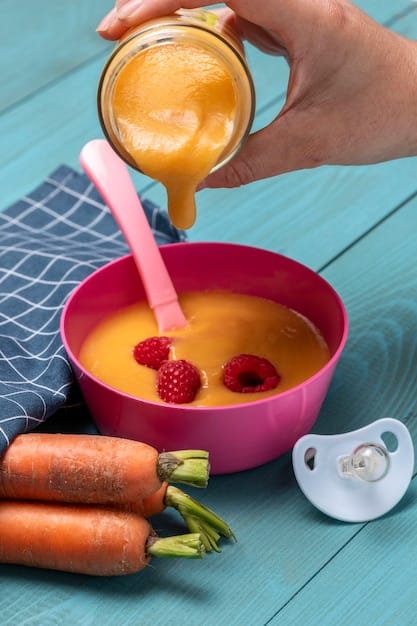
Creating homemade baby food is easier than you might think, offering a rewarding way to ensure your baby receives the freshest and most nutritious meals. With a few simple steps and the right equipment, you can whip up delicious and wholesome purees that your little one will love.
Making your own baby food allows you to select the best ingredients and tailor the flavors to your baby’s preferences. It’s also a cost-effective alternative to buying pre-made pouches.
Choosing the Right Ingredients
Opt for fresh, ripe fruits and vegetables. Organic produce is ideal, but conventional options are fine too, as long as they are thoroughly washed. Some great choices include sweet potatoes, carrots, apples, and bananas.
Preparation Methods
Steaming or baking are the best methods for cooking fruits and vegetables, as they help retain nutrients. Avoid boiling, which can leach vitamins and minerals into the water.
- Steaming: Place chopped fruits or vegetables in a steamer basket over boiling water and cook until tender.
- Roasting: Toss vegetables with a little olive oil and roast in the oven until soft.
- Pureeing: Use a blender, food processor, or immersion blender to create a smooth puree. Add water or breast milk to achieve the desired consistency.
Homemade baby food can be stored in the refrigerator for up to 72 hours or frozen in ice cube trays for longer storage. Be sure to label and date each container.
Tips for Safely Using Baby Food Pouches
Baby food pouches can be a convenient option when used safely and thoughtfully. By following a few simple guidelines, you can minimize potential risks and ensure your baby enjoys the benefits of these products.
Always check the expiration date before offering a pouch to your baby. Discard any pouches that are past their expiration date or show signs of damage.
Reading Labels
Carefully review the ingredient list to ensure that the pouch contains no allergens or ingredients that your baby may be sensitive to. Pay attention to added sugars and preservatives.
Storage Guidelines
Store pouches in a cool, dry place until ready to use. Once opened, refrigerate any unused portion immediately and consume within 24 hours.
- Spoon Feeding: Squeeze the contents of the pouch onto a spoon to avoid direct contact with your baby’s mouth, which can contaminate the remaining food.
- Variety: Offer a variety of flavors and textures from different brands to ensure your baby receives a balanced diet.
- Moderation: Use pouches as a supplement to homemade baby food, rather than a replacement.
By prioritizing safety and moderation, you can incorporate baby food pouches into your baby’s diet without compromising their health.
Making the Right Choice for Your Baby
Ultimately, the decision between baby food pouches and homemade baby food is a personal one. By weighing the pros and cons of each option and considering your baby’s individual needs, you can make informed choices that support their growth and development.
Both pouches and homemade baby food can be part of a healthy diet. The key is to prioritize high-quality ingredients, safe preparation methods, and a balanced approach.
Consider Your Lifestyle
If you have a busy lifestyle, pouches can be a convenient option for occasional use. However, aim to prepare homemade baby food as often as possible to maximize nutritional benefits.
Listen to Your Baby
Pay attention to your baby’s preferences and reactions to different foods. Offer a variety of flavors and textures to encourage healthy eating habits.
- Consult with a Pediatrician: Talk to your pediatrician or a registered dietitian for personalized recommendations on infant nutrition.
- Balance Convenience and Nutrition: Strive for a balance between convenience and nutrition to ensure your baby receives the best possible nourishment.
- Embrace Flexibility: Be open to adapting your approach as your baby grows and their nutritional needs change.
By staying informed and making thoughtful choices, you can create a feeding plan that supports your baby’s health and happiness.
| Key Point | Brief Description |
|---|---|
| ⏱️ Convenience | Pouches are portable and easy-to-use, ideal for busy parents. |
| 🍎 Nutrition | Homemade food offers more control over ingredients and freshness. |
| ⚠️ Potential Downsides | Pouches may have heavy metals and impact oral motor skills. |
| ✅ Safe Use | Read labels, check expiry dates, and use pouches in moderation. |
Frequently Asked Questions
▼
Baby food pouches are generally safe, but check for expiry dates and potential allergens. Some studies indicate possible heavy metal contamination, so choose brands with rigorous testing.
▼
Homemade baby food offers more control over ingredients and freshness, minimizing additives and preservatives. It also ensures you know exactly what your baby is consuming.
▼
Steaming or baking fruits and vegetables until soft, then pureeing them in a blender or food processor is an easy way to prepare homemade baby food. Use fresh, ripe ingredients.
▼
Baby food pouches are convenient, portable, and require no preparation, making them ideal for busy parents. They also come in a variety of flavors and combinations.
▼
Pouches should complement rather than replace homemade food, especially when starting solids. Moderation ensures a balanced diet, supporting oral motor skills with diverse textures.
Conclusion
In conclusion, while baby food pouches provide unparalleled convenience for today’s busy parents, understanding their nutritional profile and potential drawbacks is essential. Homemade baby food allows for greater control over ingredients and freshness, but requires more time and effort. By balancing these options, reading labels carefully, and prioritizing high-quality ingredients, you can ensure your baby receives the best possible nourishment for healthy growth and development.
